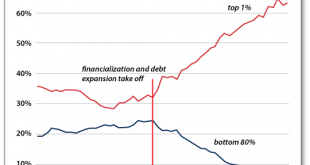[Ed. Note: Jim Rickards latest New York Times best seller, The Road to Ruin: The Global Elites’ Secret Plan for the Next Financial Crisis (claim your free copy here) goes beyond the election and prepares you for the next crisis]
An earthquake doesn’t care if you’re progressive or populist. It destroys your house all the same. Likewise a financial crisis is indifferent to a politician’s policy mix.
Systemic crises proceed according to their own dynamic based on the array of agents in a system, and systemic scale.
The tempo of recent crises in 1994, 1998, and 2008 says a crisis is likely soon. A new global financial panic will be one legacy of the Trump administration. It won’t be Trump’s fault, merely his misfortune.
The equilibrium and value-at-risk models used by banks will not foresee the new panic. Those models are junk science relying as they do on notions of efficient markets, normally distributed risk, continuous liquidity, and a future that resembles the past. None of those hypotheses match reality.
Advances in behavioural psychology have demolished the idea of efficient markets. Data shows the degree distribution of risk is a power curve not a normal bell curve. Liquidity evaporates when most needed. Prices gap down; they do not move continuously.
Each of the 1994, 1998, and 2008 crises was worse than the one before, and required more drastic intervention. The future does not resemble the past; it keeps getting worse. The standard models are in ruins.
Recent model improvements that take into account so-called tail risk still fail to come to grips with systemic scale. The most catastrophic event possible in a complex system is an exponential function of scale. In plain language, if you double system size, you do not double risk; you increase it by a factor of five or more.
Since 2008, the largest banks in the world are larger in terms of gross assets, share of total deposits, and notional value of derivatives. Everything that was too-big-to-fail in 2008 is bigger and exponentially more dangerous today.
The living wills and resolution authority of Dodd-Frank are entrances to gated communities. They seem imposing, but are a façade. They will do nothing to stop an angry mob. Increases in regulatory capital will not suffice. When a leveraged financial institution faces a liquidity panic, no amount of capital is enough. As boxing legend Mike Tyson mused, no plan survives the first punch in the face.
Banks should take a lesson from Mike Tyson.
If existing models don’t work, what does? A blend of complexity theory, Bayesian statistics, and behavioural psychology can produce models with robust predictive power. Such models are being developed in a few centers of excellence such as the Santa Fe Institute, the London School of Economics, and the Swiss Federal Institute of Technology in Zurich. Yet, they are far from mainstream thinking and will not be adopted in time to mitigate the next crisis.
Financial panics are dynamically and mathematically identical to a variety of natural phenomena such as earthquakes and avalanches. As snow accumulates on a mountainside, seasoned observers can spot avalanche danger. Soon one snowflake alights in such a way as to perturb others that begin to slide, form a chute, create momentum, and rip loose the entire snowpack. Timing is uncertain, yet the avalanche is inevitable.
What snowflake could precipitate the next financial panic? Deutsche Bank is an obvious candidate. Less obvious is a failure to deliver physical gold by a London bullion bank. That would expose the hyper-leveraged “paper gold” market for what it is. A natural disaster on the scale of Fukushima would do as well.
Looming over these catalysts is a global dollar shortage, which has been described by economists Claudio Borio and Hyun Song Shin at the Bank for International Settlements. The strong dollar could precipitate a wave of defaults on $9 trillion of dollar-denominated emerging markets corporate debt. Those defaults would make the 1994 Tequila Crisis look tame.
The 2008 crisis was truncated with tens of trillions of dollars of currency swaps, money printing, and rate cuts coordinated by central banks around the world. The next crisis will be beyond the scope of central banks to contain because they have failed to normalise either interest rates or their balance sheets since 2008. Central banks will be unable to pull another rabbit out of the hat; they are out of rabbits.
There are no rabbits left.
In the next crisis, liquidity will come from the IMF, which has the only clean balance sheet remaining. The IMF will print the equivalent of $10 trillion in world money called special drawing rights. China and Russia will acquiesce in this liquidity injection provided it hastens the demise of the dollar as the benchmark global reserve currency.
Can Trump avoid this fate? Possibly. Ski patrols reduce avalanche danger by using dynamite to descale the snowpack. Likewise the financial system can only be made safer by reducing its scale. Large vessels use watertight holds to achieve the same margin of safety. A hole in the hull floods one hold, but does not sink the ship.
Descaling finance means reinstating the Glass-Steagall and pre-Big Bang separation of deposit taking and securities underwriting. It means breaking up the big banks. JP Morgan, Chase Manhattan, and Chemical Bank should reemerge from the embrace of Jamie Dimon. Derivatives should be banned except for exchange-traded futures tied to specific assets used for commercial hedging. It’s time to close the casino.
Will Trump pursue these policies? It’s unlikely. Such proposals will be lost in a sea of competing priorities. Bank lobbyists rule Washington from the commanding heights; draining the swamp won’t change that.
Sooner than later a new treasury secretary and Fed chair will retrace the 2008 footsteps of Hank Paulson and Ben Bernanke to tell President Trump the system is having a heart attack. They will have no remedy except to suggest a call to Madame Lagarde.
Regards,
Jim Rickards
for The Daily Reckoning
Source link
 Best Stock Hints Latest Tips To Buy & Invest Best Stocks Today
Best Stock Hints Latest Tips To Buy & Invest Best Stocks Today



